In an entertaining cultural résumé entitled The Scots' Crisis of Confidence, the author Carol Craig describes a typical Scot as "opinionated, passionate, committed, judgmental ... (and prone to) a sense of under-confidence seesawing from feelings of inferiority to superiority". Leave out the last bit and you have a fine description of George Galloway, who lived up to Craig's ideal type in Glasgow City Halls last Monday night as he railed against the notion of an independent Scotland.
Fearful that the romance of nationalism is about to detach the workers of Lanarkshire, Ayshire and beyond from their natural allies south of the border, Galloway, once a pugilistic powerhouse of Glasgow politics, has embarked on a "Just say Naw" tour of his homeland. Wearing a black fedora and black waistcoat and ceaselessly chewing gum, the MP for Bradford West arrived in his former stamping ground bearing particular animus towards a hostile tweeter named Callum McIntyre.
"As I was coming up here," Galloway told this audience: "I received a tweet from a Callum McIntyre. It said simply, 'Fuck off back to England.' I don't understand Mr Callum McIntyre and his 'Fuck off back to England.' I'm as Scottish as he is. To paraphrase George W Bush, you misunderstimate me, Mr McIntyre. I'm not afraid of Saltire-waving fanatics like you."
What followed was a rollicking socialist sermon on solidarity between classes and across borders. "Don't you have more in common, as a Paisley bus driver, with a Bradford bus driver than with the Duke of Buccleuch or [Stagecoach owner] Brian Souter?" Galloway asked. "What divides people is not their passport but the class that they are … My flag is not the Saltire and it is not the Union Jack. My flag is red." Such principles were, he said, "the ABC of Labourism".
Scottish lefties needed to remember their political alphabet and vote No in next September's referendum on independence. It was a message delivered with characteristic brio, but it failed to convince Gillian Butler, a bank worker, or her friend Clare, a trainee social worker. Both in their early 20s, they belong to a generation that has grown alienated from mainstream politics. Unlike those English peers tempted to take Russell Brand's advice and stay away from the ballot box, they have the option to change the rules of the game and are increasingly inclined to do so: "Lots of people are tired of Westminster never delivering what people here have voted for," Gillian said in a nearby pub afterwards. "It feels like it's time to change things."
According to Clare, "He was good. But it doesn't feel to me like the Labour or London/Westminster route is getting anywhere in terms of what Scots want to see done in their own country about issues like equality and welfare." With due respect to their English interlocutor, and a degree of sympathy for struggling social democrats south of the border, they said the time had come to go their own way. I got my coat.
Going to Glasgow last week was my first real wakeup call to the fact that something fascinatingly new is happening in Scotland. As a northerner (northern England, that is), living in London and on the left, I had travelled in trepidation, for familiar reasons similar to those offered by Galloway.
For election after election, Scotland has shored up Labour's vote in parliament. Removing the Scottish presence in the current House of Commons would reduce Ed Miliband's ranks by 41 MPs. Tories, meanwhile, are notoriously rarer than pandas north of the border. Scottish independence would be the mother of all boundary changes and a political game-changer, potentially locking in a Conservative majority for a generation or more. That was the extent of my engagement with Scotland and its politics.
Cultural links had always been present. Growing up in the north, my first contact with Scottishness came in the early 1970s, aged eight and nine. The football team I support, Manchester United, signed up so many players from clubs such as Celtic, Aberdeen and Partick Thistle that younger fans like me took to wearing tartan scarves to games. They were easy to find: the winsome Edinburgh boys of the Bay City Rollers were dominating Top of the Pops to the extent that all the girls were wearing them too. Later, on holiday in Edinburgh, I felt obliged to pretend my name was Steve, suspecting that the truth was a little too effete for the taste of the lads I was hanging round with (Craig's sketch on Scottish traits also includes "emphasis on plainness and simplicity").
In the 80s, there would be musical heroes from Roddy Frame of Aztec Camera to Edwyn Collins of Orange Juice. I had an unoriginal crush on Clare Grogan of Altered Images. I loved Bill Forsyth's films: Gregory's Girl, That Sinking Feeling, Local Hero.
But the world of Scottish nationalism, when it crossed my mind, I dismissed as a marginal home to eccentric romantics with an unhealthy regard for blood and soil. Serious Scots politicians on the left, like John Smith, Donald Dewar and Gordon Brown, fought their battles on behalf of all of us in London. British, Scottish, English: these identities felt like different inflections of an identity that was essentially common, mixed up and composed of many shades.
My instincts were perhaps out of date at the time and certainly are now. The Anglo-Scottish row over the future of Portsmouth and Clyde shipyards last week marked the moment the independence debate entered the political bloodstream south of the border. But this moment has been a long time coming. From the poll tax at the end of the 1980s to the neglect of manufacturing industry; from the cult of privatisation to Peter Mandelson's famous willingness to appease "the filthy rich", the sweep of Westminster policymaking has placed most Scots bitterly at odds with successive London governments.
The Iraq war poisoned an already damaged relationship with Tony Blair's New Labour; the coalition government's bedroom tax is as hated now as the poll tax was then. And gradually, as the House of Commons has appeared to count Scottish votes and then chuck Scottish priorities in the bin, the terms of political debate have changed. Where the Labour machine in West Central Scotland once ruled, the SNP (Scottish National party) has stolen its clothes.
"I think George was talking in a very old-fashioned way," said Joan McAlpine, a Scottish MSP and speechwriter for the SNP leader, Alex Salmond. "The Internationale was about solidarity between people but that did not or shouldn't rule out self-determination. You've got to remember that we have had many, many years of a UK Labour-led government. And where have we got to? A recent report stated that we're the fourth most unequal country among developed economies. The inequality gap is growing. We've got a low-wage economy. That's not an enticing prospect to us for the future."
The pro-independence campaign includes the Greens and some Scottish Labour campaigners. But the driving force is the SNP, still celebrating the extraordinary majority it achieved in the Scottish parliament in 2011. And the pitch is straightforward, aimed squarely at the left-leaning electorate who gave Salmond a stunning majority two years ago and will determine the fate of September's referendum: give us the tools and the power to turn Scotland into the social democracy you want it to be. Help us establish a new "centre ground" for politics north of Hadrian's Wall, one considerably to the left on welfare benefits, health and the role of the state. The hopeful role models are Norway, Denmark, Sweden and Finland (Ireland, post-crash, gets less of a look-in).
"Scotland is already a beacon in the north," said McAlpine, citing free personal care for the elderly, free prescription fees and free tuition fees for university, all made possible by the devolution of powers to the Scottish Assembly. "We've shown it can be done differently to the way things are being done by the coalition government. We've shown it doesn't have to be that way. But how much better could it be if we had the enhanced powers of independence?" It is a vision that has ensured that Salmond's nationalists, once derided by Galloway types as Tartan Tories, have become the most fashionable progressive force among what Pat Kane – McAlpine's former partner – calls the "Scotterati". The painter Jack Vettriano, the actor Brian Cox, the poets Edwin Morgan and Liz Lochhead are all on the left and all are sympathetic to the independence cause. And in the former coalfields and steeltowns of Lanarkshire, the "Real Labour"-style message won over swaths of Labour loyalists to the SNP in 2011. If they can be persuaded to repeat that support for Salmond next September, full-blown independence may become a reality, although polls suggest that support for a Yes is struggling to break through the 30% mark.
"I'm not sure which way I'll go," said one middle-aged woman doing her shopping in Motherwell town centre," on Thursday. "I voted SNP at the last election, but I want more information, when it comes to independence." There are a million more undecided voters like her, according to polls, amounting to a quarter of the referendum electorate. The Yes campaign's white paper on how an independent Scotland would work in practice, to be published later this month, will be a defining moment of the campaign.
So much for the exciting, risky ambitions of much of the new-look Scottish left. What about the poor bloody English equivalent? The truth is that the independence debate is as much an opportunity as a danger. Taking the train back south, embattled communities flashed by. Carlisle, Preston, Wigan and Stafford, all suffering the consequences of what David Cameron once described as an "unstable and wasteful" economy which is "heavily reliant on just a few regions – particularly London and the south-east".
I was heading, as so many people do these days, for the capital. From the moment the Big Bang in the City released the animal spirits of financial capitalism, London reaped the rewards of a super-leveraged long boom. When unsustainable debts almost caused worldwide financial collapse, there was a pause for thought. House prices even briefly stabilised. But now things are getting back to normal. Post-crash, London dominates England even more outrageously than before. Morning queues stretch around the block in formerly unfashionable Walthamstow, to view houses that cost tens of thousands more to buy by teatime. Average household income is 30% higher than the rest of the UK. When it comes to arts and culture, the government last year spent £69 per head in London, compared with £4.60 a headfor everyone else in England. Such is the gulf that has emerged between London and the rest that a possible future as an autonomous city-state is mooted.
Like the Scottish, the majority of English northerners have repeatedly rejected the increasingly dysfunctional, lopsided nature of finance-driven, market-orientated, London-centric Britain. But the towns of the Pennines cannot call on a national prerogative to go their own way. Could the growing prestige, self-confidence and autonomy of Edinburgh, whether or not there is a vote for full independence, provide a pointer to a different future for the north as well?
"If I lived in north-east England, I would be jumping up and down right now, demanding regional autonomy," said Stuart McDonald, a senior researcher for the Yes Scotland campaign. "I don't think this is about Scotland versus England. It's more about everywhere outside of London versus London."
"An extraordinary city but 'another country'," reads one piece of Yes campaign literature referring not to Edinburgh but to London. "The capital and the south-east are hugely different to the rest of the UK. And that creates a huge problem for such a centralised unitary state as the UK … policies are skewed towards the capital city as the growth leader, and the other regions and nations just have to make do with the uneven playing field."
Stephen Noon, McDonald's boss and the sharp chief strategist of Yes Scotland, has translated that analysis into a siren call to northern England. Writing in the Scotsman, he suggested that an independent Scotland might, for example, back "extending the Glasgow-Edinburgh high-speed rail line to Newcastle, to create a tri-city economic zone. Such a move would draw the 2.6 million people of the north-east of England into Scotland's economic sphere. Instead of waiting 40 years for London to connect high-speed rail to us, we could choose to connect to each other and in doing so bring together almost eight million people to create a counterweight to London's gravitational pull."
Even if Scotland votes to stay in the Union, the devolution of significant further fiscal powers is very likely. Northern councils are on the case. A specially commissioned report published in the summer argues that a Scotland with enhanced powers would be free to put its heft behind investment in "major roads, seaports, airports and public transport", adding "substantial strength to a northern voice that embraces Scotland and northern England, in the face of continuing dominance of London and the south-east".
In the words of McAlpine, "Scotland could become a powerful centre-left counterpoint. An alternative centre of power to London." One far more sympathetic to the aspirations of northern England, plagued by the same problems and dilemmas since the deindustrialisation of the 1980s. As Scotland put government intervention at the heart of a future growth strategy, the north would itself surely seek an enhanced autonomy for itself, from Newcastle to Sheffield to Leeds, Liverpool and Manchester.
Idle daydreaming perhaps. But the term "North Britain" has a long history: it was used by King James VI after the Union of the Crowns of England and Scotland in 1603. The notion is not popular among Scots, who have traditionally viewed it as a provocative denial of Scottish nationhood.
As a boyhood admirer of the defensive skills of the admirable Martin Buchan, I would not wish to diminish the status of Scottishness in any way. But in the shifting landscape of 21st-century UK politics, where London's hegemony has grown too powerful and stretched too far, I quite like the idea of a swath of Britain that travels according to a different political compass.
As that Motherwell shopper put it to me, when asked how she felt about leaving fellow-travellers in the north behind: "Do you think they'll want to come and join us?" Maybe they should. Maybe they will.
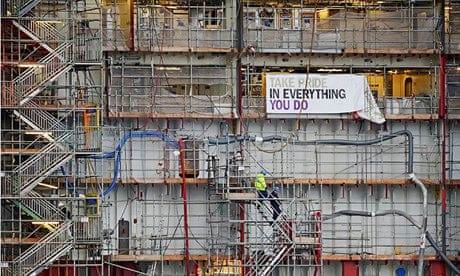
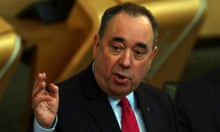
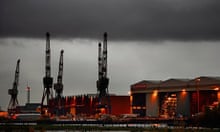

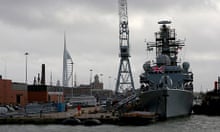

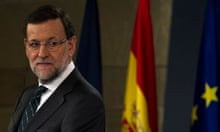




Comments (…)
Sign in or create your Guardian account to join the discussion